We continue to receive queries into the MAG Ireland office regarding bicycle engine kits and whether they are legal or not.
The short answer is that these things are NOT legal on public roads.
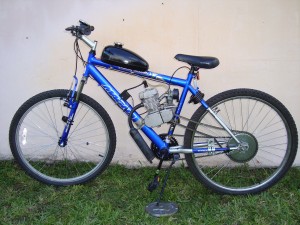
Bicycle engine kit on a pushbike
We’re aware that these motorised bicycles have been seen in our towns and cities but the riders are leaving themselves open to prosecution for a number of serious road traffic offences. If someone you know is using a motorised bicycle have a word with them and put them wise. The same law applies to motorised scooters/skateboards (see below). In a nutshell, any self-propelled vehicle used public roads will require a licence, tax and insurance and for two wheelers the rider must wear a helmet.
The Road Traffic Act of 1961 at Section 3(1) (a) and (b), defines a mechanically propelled vehicle as:
“a vehicle intended or adapted for propulsion by mechanical means, including;
(a) a bicycle or tricycle with an attachment for propelling it by mechanical power, whether or not the attachment is being used,(b) a vehicle the means of propulsion of which is electrical or partly electrical and partly mechanical, but not including a tramcar or other vehicle running on permanent rails;”
If a vehicle can be propelled without being pedalled or pushed it is considered to be a mechanically propelled vehicle irrespective of its maximum speed rating. Such vehicles need to be registered and the driver needs a licence, insurance, helmet etc. Such vehicles must also be taxed.
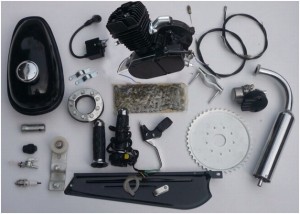
A bicycle engine kit, illegal on public roads.
Economical with the truth?
We’re aware that advertisers on popular Irish trading web sites are promoting these products as being “license exempt” or “no license needed”. Quite simply, this is not the case and as stated above there are serious penalties for riders of such machines on the public roads. We recommend you never take “license exempt” claims at face value. If in doubt, refer to the legislation quoted above or check with An Garda Síochána or the Road Safety Authority.
Electric Bicycles:
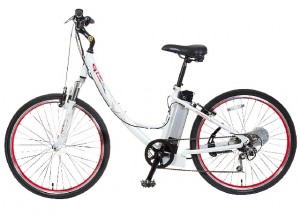
Electric Bicycle (Pedelec)
There is separate and specific legislation covering electrically assisted bicycles (pedelecs) which requires the rider to pedal in order for the electrical assistance to be delivered and which cuts out the assistance above 25kph.
This legislation was introduced under Section 7 of the Finance Act, 2008. (see here). Electrically assisted bicycles (pedelecs) do not require a license and are increasingly popular on our roads as commuters look to beat congestion.
Electric Scooters:
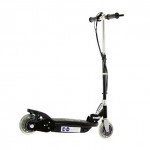
electric scooter
We are aware that a number of companies are offering or promoting electric push scooters for use on the public road. Anyone contemplating the use or purchase of such a scooter would be advised to read advice given by An Garda Síochána (source here) where they say:
What is the legal status of electric/battery powered scooters?
The use of these types of scooters has become very popular in recent years, especially with children. The legal position is that if one of these scooters can be powered by mechanical or electrical power alone, and does not require pedalling or scooting for propulsion, then the scooter is considered to be a mechanically propelled vehicle (MPV) in terms of road traffic legislation, irrespective of engine capacity. If such scooters are to be used in any public place, they require insurance and road tax as with any other MPV. The driver would also require a driving licence and is obliged to wear a crash helmet. If the user of such a scooter cannot fulfil these legal requirements, then the scooter should only be used on private property.
We in MAG Ireland strongly advise anyone considering the purchase or use of an electric push scooter to heed the advice above.
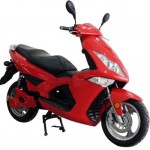
Electric Moped
Traditional moped style electric scooters are classed exactly the same way as petrol powered mopeds and these too require license, insurance and motor tax and the rider must wear a helmet. Since such electric mopeds are usually type approved for sale as a motorised vehicle there is less confusion about their use on the roads.
To sum up, any vehicle which does not require pedalling or pushing for propulsion is considered a mechanically propelled vehicle and cannot be used on public roads without license, insurance, motor tax, etc. The onus is on the end user to comply with the relevant sections of the road traffic legislation.